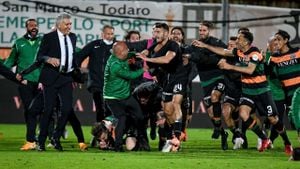Every year, on February 21, the world observes International Mother Language Day, celebrating the significance of linguistic diversity and promoting multilingualism. This observance recognizes the deep ties language has to identity, culture, and community. The Global Voices community, composed of individuals from diverse linguistic backgrounds, reflects on the meaning of their mother languages, offering insights steeped in personal, cultural, and political significance.
Rami Alhames, Arabic translation manager for the Global Voices Lingua project, describes Arabic as "the heartbeat of my identity," expressing how the language conveys the warmth of his cultural roots. Similarly, Ghaydaa Alnakhal, also from the Global Voices network, proudly asserts, "Arabic language is a treasure," acknowledging its connection to the Holy Quran and its cultural richness. For many, the mother tongue serves as a bridge to their heritage and community—a sentiment echoed by writer Elisa Marvena, who finds solace and connection through her native Spanish as she navigates life abroad.
Language serves not just as communication but as identity—and this is particularly true for the Kwanlin Dün First Nation, where citizens are revitalizing the Southern Tutchone language. The Southern Tutchone Language Revitalization Program launched by the Kwanlin Dün First Nation, with support from the Yukon Native Language Centre and Simon Fraser University, aims to encourage citizens to reconnect with their linguistic heritage. Ron Thompson, one of the program's students, shared his aspirations of inspiring his family, stating, "I've always wanted to take language but I thought I was too old for it." Chief Sean Smith highlights the loss of fluent speakers over the years, calling the program "a way of bringing the language back" to the community and contributing to cultural appreciation.
Participants of the program, including young learners like 19-year-old Kiana Blake, are excited to teach their ancestral language to others. Blake expresses pride, stating, "It's just a way our community can connect together, same with my family and friends." This immersion approach not only provides language skills but also fosters community ties, as seen through social media engagement where Blake shares the words she's learned, spreading awareness of her culture beyond the classroom walls.
The communal effort to revitalize languages echoes broader efforts across the globe, where many ethnic groups fight for recognition and preservation of their languages against oppressive narratives. For example, Iran, characterized by its multilingual fabric, faces challenges due to the prohibition of education in languages other than Persian (Farsi). Language advocates often face persecution, with recent reports highlighting activists distributing children's books written in Turki to commemorate International Mother Language Day. Turki, the mother tongue of millions, faces erasure as the state monopolizes education, favoring Persian. Activists argue this educational suppression threatens cultural identity and linguistic diversity.
Despite these struggles, advocates like Iranian President Masoud Pezeshkian, who is fluent in both Turki and Kurdish, assert the value of multilingual education. He contends, "Using these languages in schools, contrary to their beliefs, could even strengthen national unity," pointing at the potential for coexistence and mutual respect among diverse ethnic identities within Iran.
The threads of language reverberate through generations, instilling pride and resilience. Liva Andriamanantena, another translator from the Global Voices community, articulates her commitment to revitalizing the Malagasy language as it faces challenges from dominant languages. "Andrianiko ny teniko, ny an'ny hafa koa feheziko!" she declares, or "I will make my language sovereign; as for the languages of others, I will master them and make them mine as well." This sentiment is echoed by many who feel their languages reflect personal and communal histories.
Language, after all, constitutes the fabric of identity—it shapes thoughts, fosters connections, and preserves heritage. On International Mother Language Day, the global focus on linguistic diversity highlights the need for education systems and societies to embrace and support mother tongues through teaching, cultural exchange, and open dialogues. The beliefs held by members of the Global Voices community showcase how, even as languages face threats, they remain emblematic of the enduring spirit of their speakers, linking individuals to their ancestry and cultural narratives.



